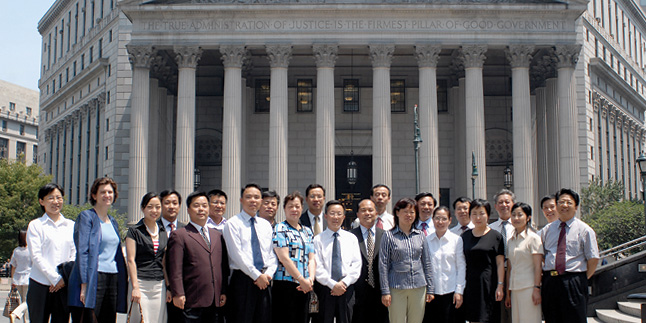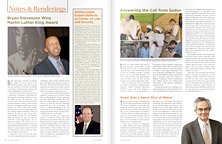Chinese Judges Take U.S. Courts Under Consideration
Printer Friendly VersionIt wasn’t the distinctively New York experience of careening and sweltering aboard the city’s famed subways that got the visiting Chinese judges excited when they visited in June; they were focused on the goings-on at the New York State Supreme Court. This year’s attendees of the Dwight D. Opperman Institute of Judicial Administration’s Training and Education Program for the Chinese Judiciary were keyed up to hear about how the state judicial process works, and explore the differences between jury and judge trials.
“The visiting judges were interested in the ways American courts function, how they relate to the executive branch and how they deal with administrative problems,” said Russell D. Niles Professor of Law Oscar Chase, codirector of the institute.
When asked if American judges should have final say in trials, the Chinese judges had varying opinions. Some, like Ouyang Zhenyuan, a senior judge of the Fourth Civil and Commercial Tribunal of the High People’s Court, felt that jury trials protected judges when sentences were handed down. Yu Chunsheng, president of the Xinjiang Wulumuqi Shayibake District Court, disagreed: “It’s hard to be an American judge. You have far more experience and yet you have to abide by a jury’s verdict.”
The judges also had the opportunity to meet with the Honorable Doris Ling-Cohan ’79 and hear about her administrative initiatives to benefit the largely Asian community in Lower Manhattan. One program that impressed the judges was the free book available at the court, cowritten in English and Mandarin by Ling-Cohan, which explains New York State court procedures.
Current events also made for lively discussion. “On the last day of the program, we discussed the Hamdan case in which the Supreme Court held that the president’s powers over the Guantánamo detainees were limited by the Geneva Conventions and Congressional action,” said Chase. “I found that the Chinese judges were as divided about the outcome as the justices of the Supreme Court.”

